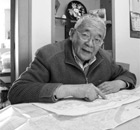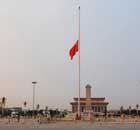Rescue & Aid
Reporter's notebook: Conditions cause high anxiety for aid teams
By Fu Jing (China Daily)
Updated: 2010-04-19 07:02
 |
Large Medium Small |
YUSHU, Qinghai — The first person I met after arriving in the earthquake zone on Saturday was Tsomo, a Tibetan woman, who waved at me as she stood atop piles of rubble that were once a small residential community in the ruined Gyegu township.
I started to slowly move over the collapsed buildings to reach her, aware that I was at 4,000 meters above sea level and traversing potentially hazardous terrain.
Then, suddenly, a hungry-looking Tibetan mastiff began to rush towards me, barking. I had never seen such a large and fierce dog in my life.
At that moment, my fears about where I was stepping were replaced by the urgent need to repel this beast, and I swung my bag at the dog with all my strength.
Luckily, several residents saw what was happening and arrived in the nick of time to stop the dog.
I was able to carry out my interview with Tsomo, who told me how she had lost not only her home, but also several relatives in the earthquake.
As she was talking, the excitement from the dog attack seemed to catch up with me. I felt very lightheaded and dizzy.
By noon, my dizziness had disappeared, yet it was a vivid reminder of what a huge difference between the difficulties facing relief efforts in Yushu and those following the Sichuan disaster.
I flew to Chengdu, capital of Sichuan, shortly after the 8-magnitude earthquake hit Sichuan on May 12, 2008. During my entire 20-day stay there, I was able to drive freely and walk in the northern corridor of disaster zone, which stretched from Deyang to Guangyuan.
Yushu, however, is in a plateau basin and has an average altitude of 4,200 meters. The change in oxygen makes most newcomers sick, and even after a person has adjusted it often means they work (and even think) far more slowly.
Some of the brave soldiers taking part in the rescue mission are not used to the environment and have suffered because of it.
The region is also tough ecologically. There is almost no vegetation on the mountains surrounding Gyegu township in Yushu county, the air is filled with sand and the weather is volatile and can go from sunshine to snowfall very quickly.
But it is not only because of the high altitude that makes the rescue challenging. Yushu is extremely far from Xining, capital of vast Qinghai (the province is China’s forth-largest in area but has a population of only 6 million).
I left Xining by car at noon on Friday but did not arrive in Gyegu until about 4 am on Saturday.
It was a good excuse for me to refresh my junior high school knowledge of geography. With colleagues in the car, we wound through high mountains roads, six of which top 4,000 meters.
When we reached almost the peak of the highest of those six, Bayan Har Mountain, our experienced driver asked me: “Are you feeling OK?”
I nodded my head and he smiled.
“You have passed the test and can do a good job in Yushu,” he said.







